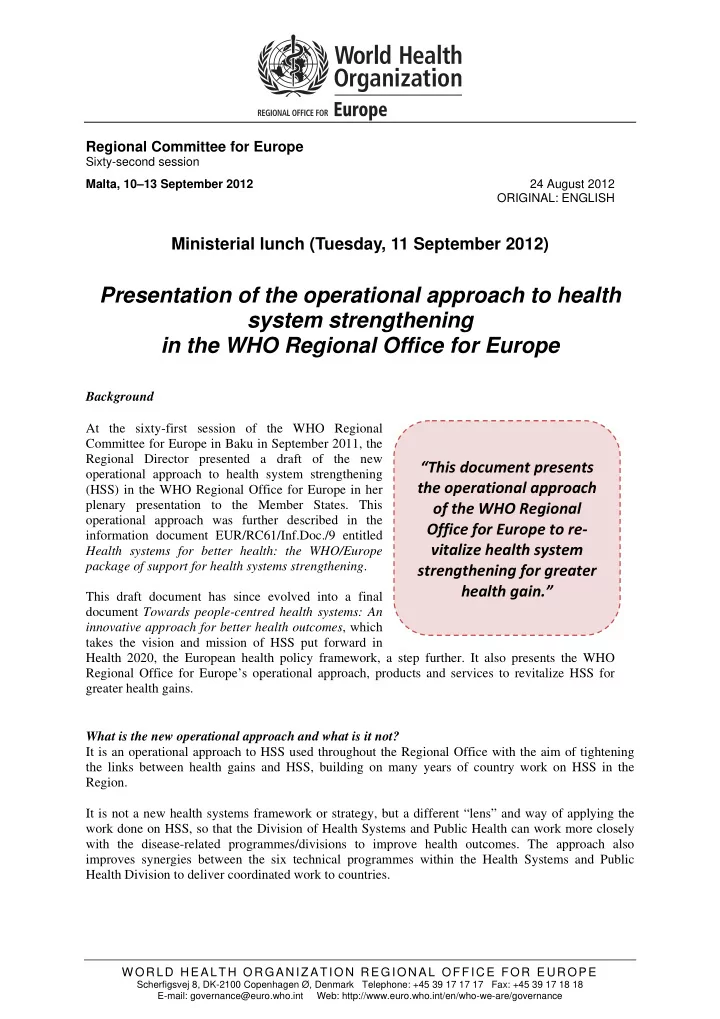

Regional Committee for Europe Sixty-second session 24 August 2012 Malta, 10–13 September 2012 ORIGINAL: ENGLISH Ministerial lunch (Tuesday, 11 September 2012) Presentation of the operational approach to health system strengthening in the WHO Regional Office for Europe Background At the sixty-first session of the WHO Regional Committee for Europe in Baku in September 2011, the Regional Director presented a draft of the new “This document presents operational approach to health system strengthening the operational approach (HSS) in the WHO Regional Office for Europe in her plenary presentation to the Member States. This of the WHO Regional operational approach was further described in the Office for Europe to re ‐ information document EUR/RC61/Inf.Doc./9 entitled vitalize health system Health systems for better health: the WHO/Europe package of support for health systems strengthening . strengthening for greater health gain.” This draft document has since evolved into a final document Towards people-centred health systems: An innovative approach for better health outcomes , which takes the vision and mission of HSS put forward in Health 2020, the European health policy framework, a step further. It also presents the WHO Regional Office for Europe’s operational approach, products and services to revitalize HSS for greater health gains. What is the new operational approach and what is it not? It is an operational approach to HSS used throughout the Regional Office with the aim of tightening the links between health gains and HSS, building on many years of country work on HSS in the Region. It is not a new health systems framework or strategy, but a different “lens” and way of applying the work done on HSS, so that the Division of Health Systems and Public Health can work more closely with the disease-related programmes/divisions to improve health outcomes. The approach also improves synergies between the six technical programmes within the Health Systems and Public Health Division to deliver coordinated work to countries. WORLD HEALTH ORGANIZATION REGIONAL OFFICE FOR EUROPE Scherfigsvej 8, DK-2100 Copenhagen Ø, Denmark Telephone: +45 39 17 17 17 Fax: +45 39 17 18 18 E-mail: governance@euro.who.int Web: http://www.euro.who.int/en/who-we-are/governance
Ministerial lunch (Tuesday, 11 September 2012) page 2 At the heart of our operational approach is the provision of support to Member States to examine and scale up delivery of people-centred core services in areas that are of high priority for health improvement, by removing health system barriers that stand in the way. The approach rests on the three pillars shown in Fig. 1 below: (i) specification of priority health improvement areas; (ii) ensuring universal coverage of core services in the priority health improvement areas; and (iii) removing health system barriers that limit the coverage of core services. While keeping a systemic orientation, this approach allows a tighter link to be forged between HSS actions and policies, on the one hand, and priority health outcomes, on the other. This linkage is articulated by putting core services for priority health improvement areas in the spotlight and examining coverage rates in general and for vulnerable groups in particular. Fig. 1. Three pillars of health system strengthening Our way of working Cross ‐ divisional products and Working this way, we hope to implement our services vision of people-centred health systems that strive HSS for accelerating to attain maximum health gain for the population given fiscal constraints and to protect individuals outcomes for from experiencing undue financial hardship due to noncommunicable seeking care, while remaining responsive to diseases citizens’ legitimate expectations. HSS for halting the While we focus on health systems, we epidemic of multidrug ‐ acknowledge the critical role of health resistant tuberculosis determinants that lie outside the health sector and we seek ways to influence these determinants.
Ministerial lunch (Tuesday, 11 September 2012) page 3 This approach will be used by the Regional Office for carrying out country-specific and regional analytical work related to health systems, organizing training events, engaging in policy dialogues and developing tighter collaboration with technical programmes within the Regional Office. Discussion 1. In the opinion of Member States, what are some critical health system challenges that have hindered the achievement of desired health outcomes in countries? 2. In which areas would you like to see the WHO Regional Office play a more prominent role in overcoming health system barriers? 3 | P a g e
Recommend
More recommend